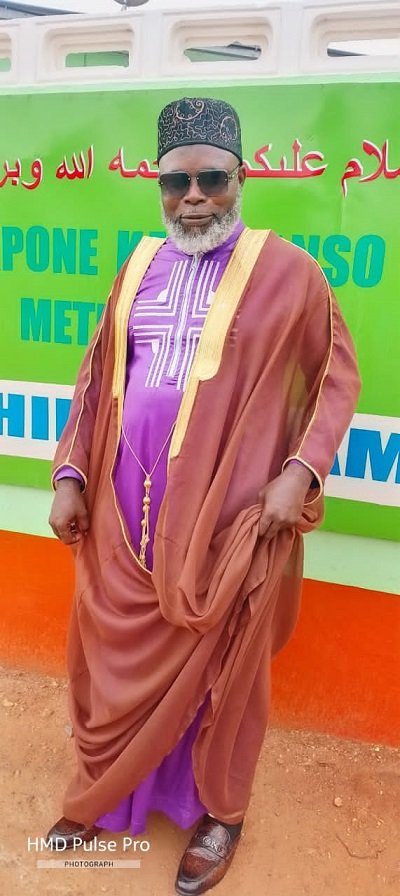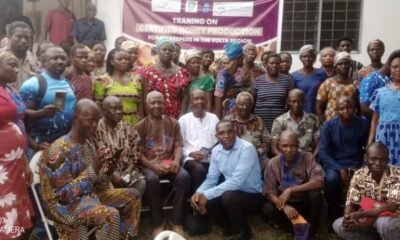Fruitful Living
Who I am in Christ (Part 1)
INTRODUCTION:
We are privileged to belong to God’s family, a community with Christ as the founder and foundation. Everyone in this community is related – we are all brothers and sisters, loved equally by God. Our safety and security are in God. If we experience all these joy in relationship with Christ now, how greater will your joy be when He returns and we see Him face to face. Such a hope should motivate us to serve Christ with greater commitment and live the life of Christ here on earth.
IN CHRIST I AM ACCEPTED
- I AM GOD’S CHILD – Yet to all who received Him, to those who believed in His name, He gave the right to become children of God – John 1:12.
- I AM CHRIST’S FRIEND – I no longer call you servants, because a servant does not know his master’s business. Instead, I have called you friends, for everything that I learned from my Father I have made known to you – John 15:15
- I HAVE BEEN JUSTIFIED – Therefore, since we have been justified through faith, we have peace with God through our Lord Jesus Christ – Romans 5:1
- I AM UNITED WITH THE LORD, AND I AM ONE SPIRIT WITH HIM – But he who unites himself with the Lord is one with Him in spirit – 1 Corinthians 6:17
- I HAVE BEEN BOUGHT WITH A PRICE, I BELONG TO GOD . You were bought with a price. Therefore, honour God with your body – 1 Corinthians 6:20
- I AM A MEMBER OF CHRIST’S BODY – Now you are the body of Christ, and each one of you is a part of it – 1 Corinthians 12:27
- I AM A SAINT – Paul, an apostle of Christ Jesus by the will of God, to the saints in Ephesus, the faithful in Christ Jesus – Ephesians 1:1
- I AM CHOSEN BY GOD – For He chose us in Him before the creation of the world to be holy and blameless in His sight. In love – Ephesians 1:4
- I HAVE BEEN ADOPTED AS GOD’S CHILD – …He predestined us to be adopted as His sons through Jesus Christ, in accordance with His pleasure and will.. – Ephesians 1:5
- I HAVE DIRECT ACCESS TO GOD THROUGH THE HOLY SPIRIT- For through Him we both have access to the Father by one Spirit – Ephesians 2:18
- I HAVE BEEN REDEEMED AND FORGIVEN OF ALL MY SINS – For He has rescued us from the dominion of darkness and brought us into the Kingdom of the Son He loves, in whom we have redemption, the forgiveness of sins – Colossians 1:13-14
- I AM COMPLETE IN CHRIST – …and you have been given fullness in Christ, who is the head over every power and authority – Colossians 2:10
IN CHRIST I AM SECURE
- I AM FREE FROM CONDEMNATION – Therefore, there is now no condemnation for those who are in Christ Jesus, because through Christ Jesus the law of the Spirit of life set me free from the law of sin and death – Romans 8:1-2
- I AM ASSURED THAT ALL THINGS WORK TOGETHER FOR GOOD – And we know that in all things God works for the good of those who love Him, who have been called according to His purpose – Romans 8:28
- I AM FREE FROM ANY CONDEMNING CHARGES AGAINST ME – What then, shall we say in response to this? If God is for us, who can be against us? He who did not spare His own Son, but gave Him up for us all – how will He not also, along with Him, graciously give us all things? Who will bring any charge against those whom God has chosen? It is God who justifies. Who is he that condemns? Christ Jesus, who died – more than that, who was raised to life – is at the right hand of God interceding for us – Romans 8:31-34
- I HAVE BEEN ESTABLISHED, ANOINTED AND SEALED BY GOD – Now it is God who makes both us and you stand firm in Christ. He anointed us, set His seal of ownership on us, and put His Spirit in our hearts as a deposit, guaranteeing what is to come – 2 Corinthians 1:21-22 .
- I AM CONFIDENT THAT GOD WILL COMPLETE THE GOOD WORK HE STARTED IN ME – …being confident of this, that He who began a good work in you will carry it on to completion until the day of Christ Jesus – Philippians 1:6
To Ponder!
Enjoy Ambrosius, (340-394); translated by Charles Wesley’s (1709-87) hymn in Methodist Hymn Book 33.
- INFINITE God, to Thee we raise
Our hearts in solemn songs of praise;
By all Thy works on earth adored.
We worship Thee, the common Lord;
The everlasting Father own,
And bow our souls before Thy throne.
- Thee all the choir of angels sings
The Lord of hosts, the King of Kings;
Cherubs proclaim Thy praise aloud,
And seraphs shout the Triune God;
And: Holy, holy holy! cry,
Thy glory fills both earth and sky!
- God of the Patriarchal race,
The ancient seers record Thy praise,
The goodly apostolic band
In highest joy and glory stand;
And all the saints and prophets join
To extol Thy majesty divine.
- Head of the martyrs’ noble host,
Of Thee they justly make their boast;
The Church, to earth’s remotest bounds,
Her heavenly Founders’ praise resounds;
And strives, with those around the throne,
To hymn the mystic Three in One.
- Father of endless majesty,
All might and love they render Thee;
Thy true and only Son adore,
The same in dignity and power;
And God the Holy Ghost declare,
The saints’ eternal Comforter.
To be continued!
Stay Blessed!
For further inquiries please contact us on Tel Nos. 0243588467 or 0268130615
Email: saltnlightministries@gmail.com
Website: saltandlightministriesgh.org
By Dr Joyce Aryee
Fruitful Living
Eid-ul-Adha: A living legacy of faith, sacrifice, and devotion

We begin in the name of Allah, the Most Merciful, the Most Compassionate. We praise Him, seek His help and forgiveness, and seek refuge in Him from the evils of our souls and the wrongs of our actions.
May peace and blessings be upon the Prophet Muhammad (peace be upon him), his family, his noble companions, and all those who follow his path until the Day of Judgment.
Understanding the essence
of Eid-ul-Adha
Eid-ul-Adha, the Festival of Sacrifice, is one of the two major Islamic celebrations observed by Muslims across the world.
It commemorates the unwavering submission of Prophet Ibrahim (Abraham, peace be upon him) to Allah’s command when he was prepared to sacrifice his beloved son Isma’il (Ishmael, peace be upon him). Allah, in His infinite mercy, intervened and replaced the son with a ram, thus honouring Ibrahim’s sincerity and faith.
This moment of sacrifice is recorded in the Qur’an: “Then when they had both submitted and he put him down upon his forehead, We called out: ‘O Ibrahim! You have fulfilled the vision.’ Indeed, We thus reward the doers of good.” (Surah As-Saffat, 37:103–105)
This act of obedience is not merely a historical account. It is a living symbol that forms the essence of Eid-ul-Adha.
Ibrahim (A.S): The Architect
of Submission
Before the moment of sacrifice, Prophet Ibrahim and his family played critical roles in establishing Islam’s foundational pillars:
1. The building of the Ka‘bah
Prophet Ibrahim and his son Isma’il were chosen to construct the Ka‘bah, the sacred House of Allah in Makkah. The Qur’an records this noble moment:
“And [mention] when Ibrahim was raising the foundations of the House and [with him] Isma’il, [saying], ‘Our Lord, accept [this] from us. Indeed, You are the Hearing, the Knowing.’”
(Surah Al-Baqarah 2:127)
This structure remains the spiritual centre of Muslim worship, facing which over a billion Muslims direct their daily prayers.
2. The struggle of Hajar (Hajara) between Safa and Marwa
The mother of Isma’il, Hajar (Hajara), exemplifies a profound lesson of patience and faith. Left in the barren valley of Makkah with her infant, she ran between the hills of Safa and Marwa, desperately searching for water. Her perseverance was rewarded when the well of Zamzam sprang forth at the feet of her baby.
Her sincere struggle is now ritualised in Hajj as the Sa‘i between Safa and Marwa—a reminder of the role of women, the power of du‘a, and the value of trust in Allah’s provision.
Sacrifice at Mina and the
Rites of Jamarat
During Hajj, pilgrims reenact Ibrahim’s confrontation with Shaytan at Mina, where he rejected the devil’s temptation and cast stones at him. This act is now observed in Hajj as the ritual of stoning the Jamarat, symbolising the rejection of evil, temptation, and disobedience.
It is a vivid spiritual lesson: the path to Allah is one of resistance to distraction and sin, and one must be prepared to fight these forces with unwavering faith.
The essence of Arafat in Hajj
The Prophet Muhammad said:“Hajj is Arafah.” (Sunan al-Tirmidhi, 889)
Standing on the plain of Arafat, in deep humility and supplication, is the heart of Hajj. It represents the Day of Judgment, when all of humanity will stand before their Creator. The Prophet said: “There is no day on which Allah frees more people from the Fire than the Day of Arafah.” (Sahih Muslim, 1348)
For pilgrims, Arafat is a time of repentance, reflection, and renewal— and for non-pilgrims, fasting on that day is highly recommended.
Three core lessons from the
Sacrifice of Prophet Ibrahim
(A.S.)
1. Absolute obedience to Allah
Ibrahim’s willingness to sacrifice his son teaches that the essence of faith is unquestioning obedience to Allah. He prioritised divine command over emotion, logic, or comfort.
Takeaway:
In our lives, we must also be ready to put aside our desires, egos, and even attachments if they conflict with Allah’s instructions. This may involve sacrifices such as waking up for Fajr, staying away from haram income, or being truthful in difficult situations.
2. Sincere intention and inner sacrifice
The real essence of the sacrifice lies in the heart’s submission to Allah.
It is neither their meat nor their blood that reaches Allah, but it is your piety that reaches Him.”
(Surah Al-Hajj 22:37)
Takeaway:
Every act of worship should be grounded in sincerity. Whether it is prayer, charity, or sacrifice, what matters most is the purity of our intention.
3. Sacrifice for the greater good
The legacy of Eid-ul-Adha teaches us that sometimes, faith requires us to give up what we love for a greater purpose. Sacrificing wealth, time, or status in the path of Allah or for the benefit of others leads to spiritual elevation.
Takeaway:
Use your resources such as time, money, skills, for acts of benefit: support the poor, educate the young, assist the sick, and build your community.
Celebrating Eid-ul-Adha: A
Festival for all Muslims
Even for those who do not go on Hajj, Eid-ul-Adha holds immense significance. Muslims across the world participate in the act of Qurbani (sacrifice) to honor the tradition of Ibrahim (A.S.).
Types of animals and their
symbolism
Permissible animals include goats, sheep, cows, and camels. Each must meet a minimum age and be free of defects. The sacrificed animal is then divided into three parts: one for the family, one for relatives and friends, and one for the poor and needy.
This distribution reflects the spirit of sharing, compassion, and social responsibility—values at the heart of Islam.
The eternal message of Eid-ul-Adha
Eid-ul-Adha is not merely a celebration; it is a living tradition that calls us to:
• Submit like Ibrahim,
• Strive like Hajar,
• Sacrifice like Isma’il,
• Reflect like the pilgrims at Arafat.
May this Eid awaken within us a renewed commitment to obedience, sincerity, and compassion.
Let us make every Eid-ul-Adha a step forward in our spiritual journey, embodying the values of submission, sacrifice, and service to humanity. I wish every Muslim Eid Mubaarak
By Imaam Alhaji Saeed Abdulai
(Kpone Katamanso Metropolitan Chief Imaam)
Fruitful Living
Steps taken by government to combat illicit drugs (Final part)
The Minister for the Interior, Muntaka Mohammed-Mubarak, has reaffirmed the government’s commitment to combating drug abuse and illicit trafficking for a safer environment which would
go a long way to make Ghana a drug-free country. 3News.com (2025)
Solutions to Illicit Drugs from the Islamic perspective
are comprehensive and emphasise of both prevention and treatment:
Tarbiyah (Islamic nurturing): Instilling strong Islamic values from childhood through Qur’anic education, regular prayer, and association with righteous companions.
Community preaching (Da’wah): Imams must consistently raise awareness during khutbahs and Islamic programs about the dangers of drugs and the beauty of a sober, productive life.
Faith-based rehabilitation: Mosques and Islamic centers can partner with medical institutions to offer Qur’an therapy, spiritual counseling, and structured recovery programs.
Islamic youth clubs: Providing youth with halal entertainment, mentorship, and purposeful engagement can steer them away from harmful peer groups.
Zakat and Sadaqah: Channelling funds to support families of victims and establishing centres for rehabilitation.
Role of Parents, Society, Muslim Chiefs and Imams:
Parents must be vigilant and provide emotional support. A loving, nurturing home reduces a child’s vulnerability to drugs.
Society should de-stigmatize addiction. Drug users should be seen as patients needing healing, not criminals deserving rejection.
Muslim Chiefs must lead community campaigns, setting moral examples and supporting policy enforcement.
Imams must be more than religious leaders—they must become counsellors, educators, and advocates. Their leadership can shift public perception and guide collective action.
Conclusion
Illicit drugs pose one of the most dangerous threats to our society, undermining our religious values, harming our youth, and destroying our future. The Islamic position is clear and
Unequivocal: such substances are forbidden due to their destructive consequences on all aspects of life. Islam does not merely condemn the act but calls for a holistic response—spiritual, social, and structural.
As a society, particularly as Muslims, we must rise to confront this crisis with faith, compassion, and commitment. We must not only preach against drugs but actively work to rehabilitate victims, educate the next generation, and partner with public institutions to create a society of wellness and righteousness.
Recommendations
1. Introduce Islamic drug awareness education in madrasas and public schools, using Quran and Hadith-based materials to instill moral responsibility.
2. Create partnerships between the Ghana Narcotics Control Commission, Ghana Health Service, and Muslim organisations to develop culturally sensitive rehabilitation centres.
3. Train Imams and teachers in basic mental health and drug abuse counselling to serve as front-line responders in communities.
4. Utilise Friday sermons (khutbahs) nationwide to address the dangers of drug abuse periodically and provide practical steps for prevention.
5. Encourage community surveillance, where parents, chiefs, and youth groups report dealers and suspicious activities to the authorities.
6. Establish mentorship programmes in every Muslim community where successful, drug-free role models mentor youth.
7. Form interfaith coalitions, working across religious lines to tackle the drug menace as a national threat rather than a religious issue.
8. Provide job skills training for rehabilitated victims, helping them reintegrate into society and live dignified, self-sufficient lives.
By Imam Alhaji Saeed Abdulai, the Author







